Bremer Canyon supports one of the most astonishing aggregations of marine life anywhere on the planet and Pia Markovic has a daily front row seat as Naturaliste Charter's marine biologist! We caught up with Pia recently to find out more about her role researching some of the world's most incredible and endangered marine species including the famed Orca.
How long have you been a marine biologist with Naturaliste Charters?
Since January 2019, but I worked as a marine biologist and tour guide for two years prior.
What did you do for work as a marine biologist previously?
When I finished my undergraduate degree, which was a bachelor of science double majoring in marine science and conservation and wildlife biology, I went into tourism.
I was working as a snorkel guide on the Great Barrier Reef, Ningaloo Reef and then out of Perth around Rottnest Island and Carnac Island, doing the same thing; snorkel guiding and deckhand work.
Then, I got the job as a marine biologist with Naturaliste Charters.
For each of the previous snorkel guide roles, the job titles were ‘marine biologist and snorkel guide’ but the research element ended up being a relatively minor part of the position.
Naturaliste is the first role I've had where there’s some solid research coming out of what we do on a daily basis.
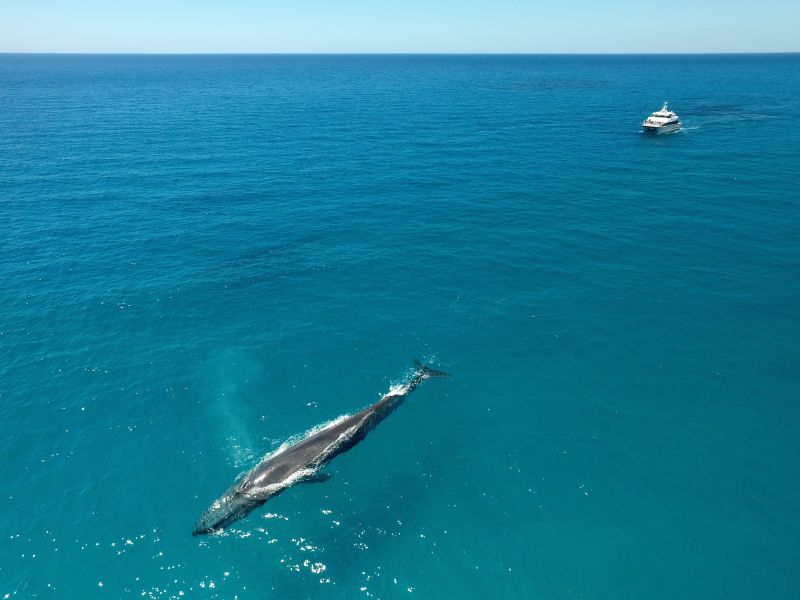 The endangered Blue Whale swims ahead of a Naturaliste Charters vessel. Image: Naturaliste Charters
The endangered Blue Whale swims ahead of a Naturaliste Charters vessel. Image: Naturaliste Charters
What do you enjoy most about your role as a guide with Naturaliste Charters?
The variety in the role, the different animals we get to witness and the unique passengers!
Can you tell us a bit more about your passion for wildlife and marine life in particular?
Each location is so unique with different whales and different behaviours, so it's really hard to pick a favourite!
But the Orca in Bremer Bay are so intense - long hours and away from home, but when the Orca put on a show you kind of have to pinch yourself. Is this even real?
Do you have a favourite species?
It has to be the Orca, they’re pretty cool, aren’t they! I like everything, I’m not fussy, but Orcas are pretty special.
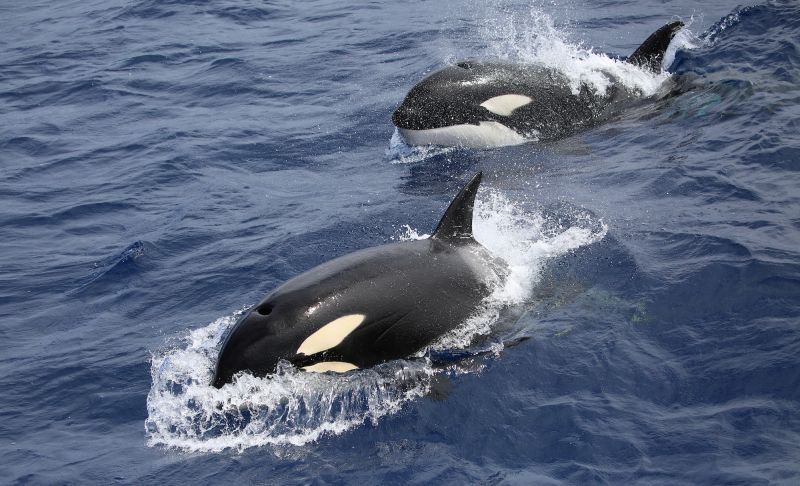 A pair of Orcas swimming alongside a Naturaliste Charters tour. Image: Naturaliste Charters
A pair of Orcas swimming alongside a Naturaliste Charters tour. Image: Naturaliste Charters
We hear them being called Killer Whales and Orcas - what should we actually be calling them?
Both! Orcinus Orca is their scientific name so Orca is probably most appropriate but the name Killer Whale is from a Spanish derivative where a miscommunication occurred and they should have been called 'killer of whales' or 'whale killer'.
Technically, they are in fact whales since they belong to the Delphinidae family which belongs to the sub-order "toothed whale".
What is the most interesting or amazing thing you’ve witnessed them do?
Probably the Blue Whale attack, just because it was so unheard of. It had never been seen before in Australia. I was really lucky, I was able to witness the first one and then it happened a second time.
Can you describe it?
It’s pretty overwhelming, especially because I knew what the Orca were capable of because I’d been working with them for pretty much the whole season.
The first Blue Whale predation was on a really stormy day - it was really eerie. We could barely see through the fog and there were Killer Whales everywhere.
The second time, it was a really nice day. It was madness from the beginning. As we dropped off the shelf, there were Dolphins, Orcas and Pilot Whales surging around and there were also oil slicks (usually as a result of whales being attacked, and oil leaking from their body), so we knew that they were up to something.
Then when we came up on the Blue Whale, it was really overwhelming because it was still alive. The first predation we witnessed, we didn’t see much of it, we really just came on the end of the predation. The second one we watched for 20 minutes - actually seeing it being killed. That was pretty overwhelming.
The smell as well - with the smell of the predation, it’s a really organic, raw smell (really hard to describe). There was oil coming out of it because it was still alive. You’re looking at an animal being predated on and you’re sort of cheering on the Orca because that’s what you’re here to see, but then you realise that there aren’t many Blue Whales left and then the sound of the people on the boat cheering or gasping, the blows of the Killer Whales, the sound of the boat and the smell. It kind of gets all of your senses going.
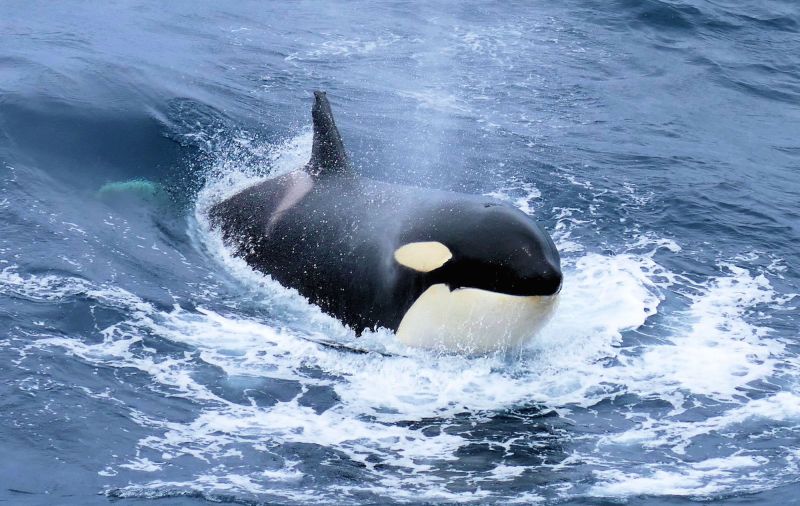 A pair of Orcas swimming alongside a Naturaliste Charters tour. Image: Naturaliste Charters
A pair of Orcas swimming alongside a Naturaliste Charters tour. Image: Naturaliste Charters
Were people on board upset by the experience?
Well, I was crying! I wasn’t crying because it was sad, it was just overwhelming. You don’t really know how to feel. I think everyone was the same.
What makes Bremer Bay the best spot in the world to see Killer Whales?
The high chance you will get to witness them throughout the season January to April! Also the population size - largest in the southern hemisphere, sometimes we witness 70 plus orca all at once!
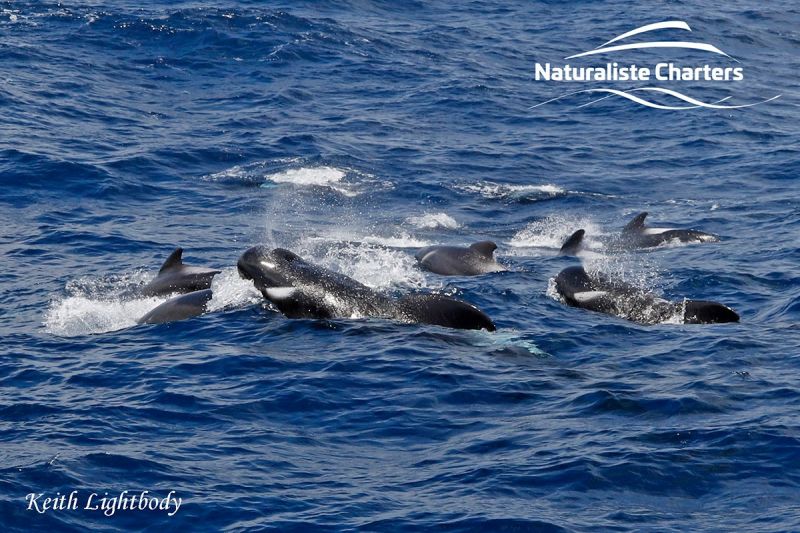 Pilot Whales are also often seen on the Bremer Killer Whale Expedition. Image: Keith Lightbody
Pilot Whales are also often seen on the Bremer Killer Whale Expedition. Image: Keith Lightbody
The Naturaliste Charters team have been actively studying Orcas for years - are there any recent findings you can share?
We collect data on a daily basis, from locations to individual whales and also what they are up to - whether that's social activity, feeding or something else. This will form the basis of a long term study to help understand how to protect these whales, their food source and their habitat.
Being out in the Bremer Canyon every day (during the 4 month season) means we get to see some pretty cool and unique stuff! Mainly beaked whale predations, but also two Blue Whale predations which were the only two to be recorded in Australia and the second and third time it was witnessed in the world! Groundbreaking! This all adds to the significant amount that we already know about the Orca!
There is also a research vessel that comes to the canyon for a fortnight each season and intensely studies the whales. They are researchers from Western Australia and Australia wide. They look at tagging, acoustics and genetic sampling - several things that we are unable to do on the tour vessel!
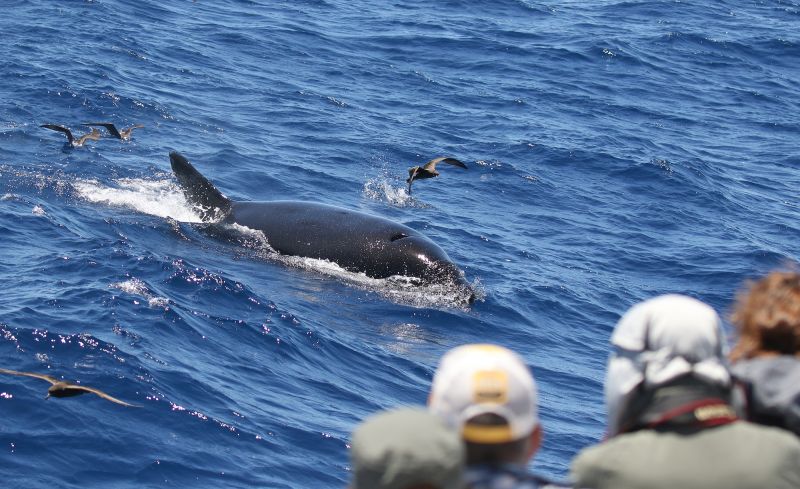 Naturaliste Charters give guests the best viewing opportunities! Image: Naturaliste Charters
Naturaliste Charters give guests the best viewing opportunities! Image: Naturaliste Charters
Have you noticed any changes to the ecosystem?
Since I am a scientist, It would be too hard to say definitively without looking at hard data!
However, we have noticed MORE Orca interactions than ever before.
This will be something we continue to look at in the future. Maybe the Orca as more comfortable with us or we are more aware of how to find them, either way, it means more action!


